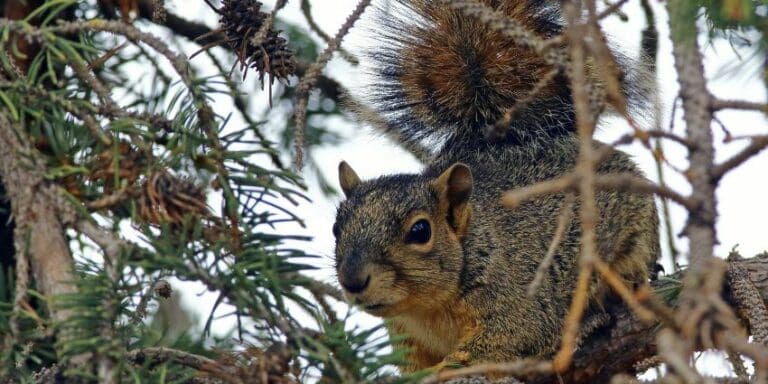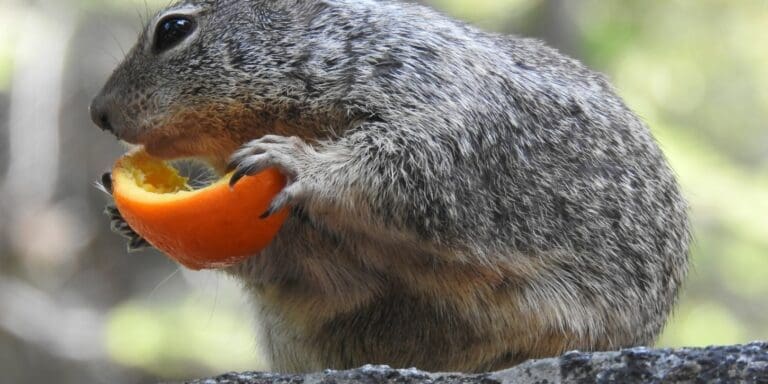What are the Positive Things About Squirrels? Discover Now!
When most people think of squirrels, they may imagine them as pesky rodents that steal bird seed and cause damage to gardens. However, squirrels have a plethora of positive attributes that are often overlooked. These small, furry creatures are fascinating and play an important role in ecosystems. In this article, we will explore the positive things about squirrels that will inspire you to look at them in a new light.
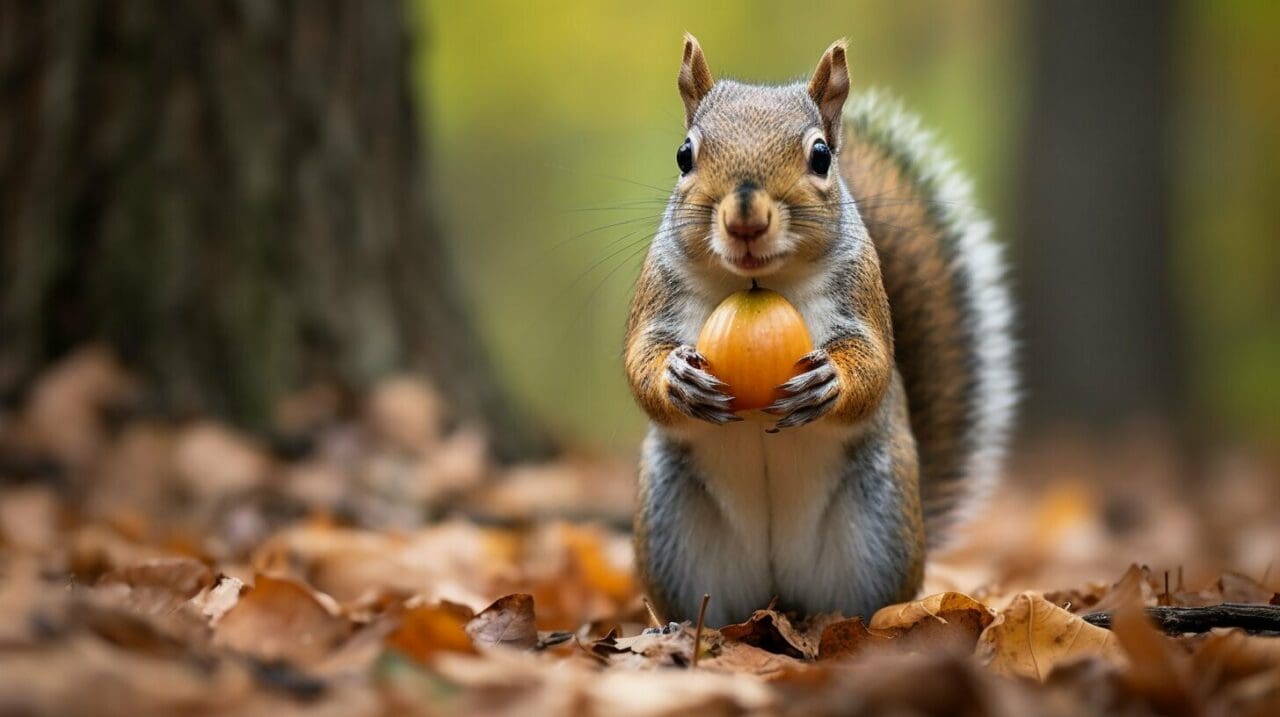
Key Takeaways:
- Squirrels have many positive attributes that are often overlooked
- They play an important role in ecosystems
- This article will inspire readers to appreciate and value squirrels
Squirrel Behavior and Characteristics
Squirrels are fascinating creatures known for their acrobatic abilities and resourcefulness. They are agile climbers and can run up to 20 miles per hour on the ground. These creatures are also known for their curiosity, often investigating new objects in their environment.
One interesting squirrel behavior is their habit of caching food. Squirrels gather nuts, seeds, and other food items and store them in multiple locations to ensure a steady food supply. They have an incredible memory and can remember the location of their caches months after burying them.
Squirrels are remarkably adaptable to various environments. They can be found in forests, urban parks, and even suburban neighborhoods. They are diurnal and active during the day, spending much of their time searching for food and building nests.
Examples of Squirrel Characteristics
| Characteristics | Description |
|---|---|
| Sharp Teeth | Squirrels have sharp teeth that help them chew through tough nuts and seeds. |
| Bushy Tails | Squirrels have bushy tails that serve as a form of communication and balance. |
| Strong Hind Legs | Squirrels have strong hind legs that allow them to jump from tree branch to tree branch. |
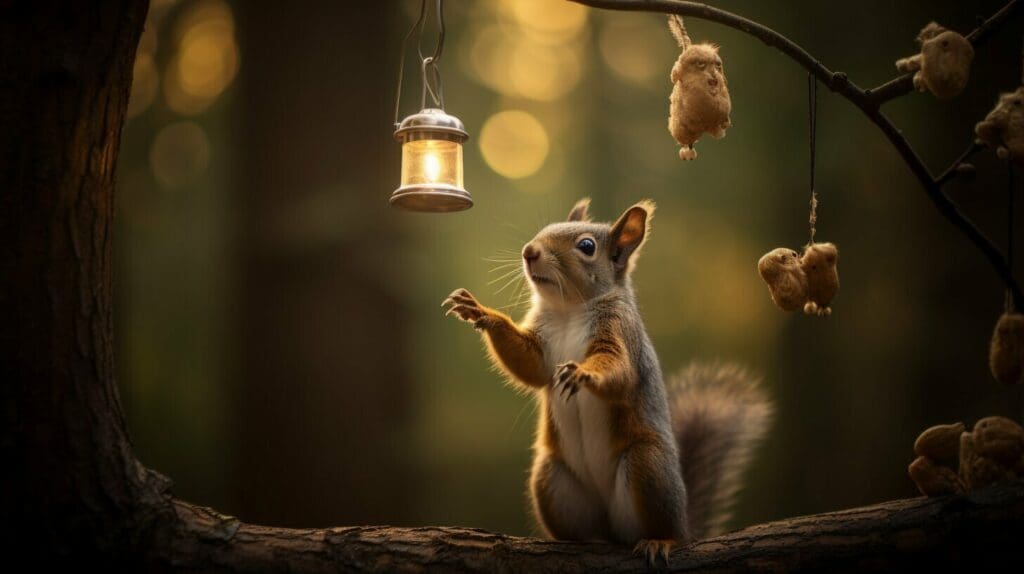
“Squirrels may seem like just cute and fuzzy animals, but they are incredibly intelligent and innovative in their behaviors and adaptations.”
Overall, the behavior and characteristics of squirrels are remarkable and intriguing. It is no wonder why these creatures are appreciated and loved by many.
Squirrel Intelligence and Adaptations
Squirrels may look cute and fluffy, but they are also incredibly intelligent. These clever creatures have developed some fascinating adaptations that allow them to survive in a variety of environments.
One of the most impressive adaptations of squirrels is their problem-solving ability. They have excellent memory and spatial cognition, allowing them to navigate complex environments and remember where they have hidden their food caches. In fact, studies have shown that squirrels are capable of solving puzzles and figuring out how to access food that is hidden behind barriers.
| Adaptation | Description |
|---|---|
| Sharp Teeth | Squirrels have sharp incisors that are perfect for cracking open nuts and seeds. |
| Strong hind legs | Squirrels have powerful hind legs that allow them to jump long distances and escape from predators. |
| Bushy Tails | Squirrels use their tails for balance and communication, as well as insulation during cold weather. |
Another fascinating adaptation of squirrels is their ability to communicate with each other through a variety of vocal and nonvocal signals. They use their tails to signal danger, and make a range of noises to communicate with other squirrels.
Overall, squirrels are an incredibly intelligent and adaptable species that have developed some truly impressive characteristics. Their problem-solving abilities, sharp teeth, strong hind legs, and bushy tails are just a few examples of the amazing adaptations that these creatures have developed over time to survive in a variety of environments.
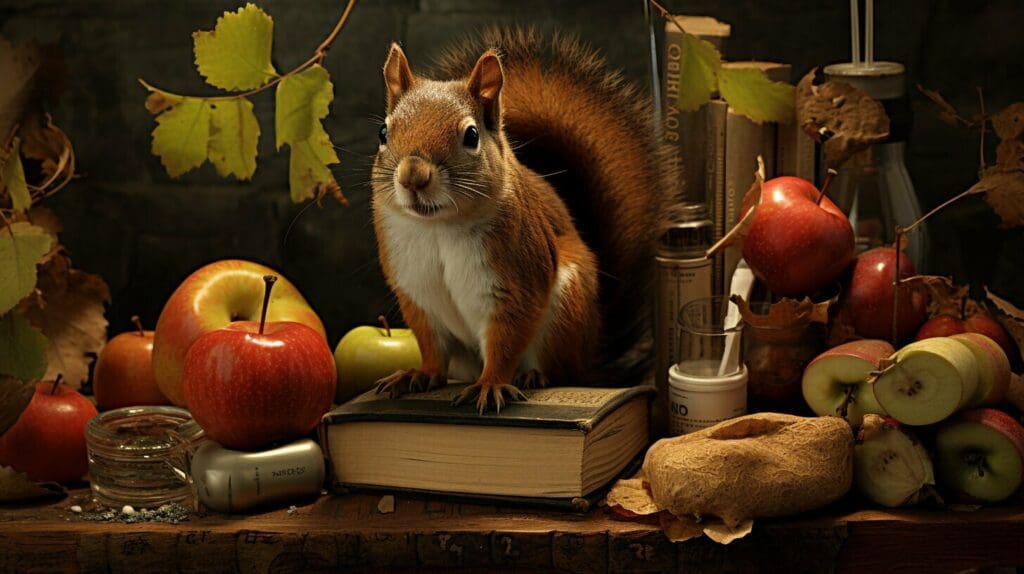
Squirrels and Ecosystems
Squirrels play an essential role in many ecosystems, contributing to seed dispersal and forest regeneration. One of their most impressive behaviors is caching food, which involves hiding nuts and seeds for future use. This behavior not only helps squirrels survive winter when food is scarce, but it also shapes the landscape by planting trees and other plants. For example, an oak tree can produce up to 10,000 acorns in a season, and squirrels can bury several hundred of them in different locations. When some of these caches are forgotten, the acorns grow into oak trees, contributing to forest regeneration.
Squirrels also impact tree growth by pruning branches and dispersing fungal spores. When they chew on branches, they prevent overcrowding and help trees grow faster and stronger. Furthermore, squirrels can spread fungal spores by carrying them on their fur and feet, contributing to the growth of new mycorrhizal networks in the soil. The mycorrhizal networks are essential for the nutrient uptake of the trees, and without them, the trees would face difficulty in growing and surviving.

Overall, squirrels are vital for maintaining healthy ecosystems. By planting trees and other plants, dispersing fungal spores, and pruning branches, they contribute to the growth and regeneration of forests. It is crucial to appreciate and protect these creatures to maintain the balance of our natural environment.
Squirrel Conservation and Benefits
Squirrels play a vital role in maintaining healthy ecosystems due to their contribution to seed dispersal and forest regeneration. By burying and forgetting their caches, squirrels unintentionally plant new trees and promote the growth of existing ones. This behavior not only increases the overall biodiversity of forests but also helps prevent soil erosion.
Conserving squirrel populations is crucial to prevent negative ecological impacts on forests and the animals that depend on them. Squirrels can maintain tree health by removing diseased or dead branches, preventing further damage to the forest. Additionally, they are an important food source for many predators, including hawks, owls, and foxes. Without squirrels, these predators would struggle to find enough food to survive.
Squirrels also provide benefits to humans, especially in urban environments. Their playful behavior and acrobatics can provide entertainment, and observing them in their natural habitat can promote a connection to nature. Furthermore, they help control insect populations by feeding on insects that would otherwise damage crops and gardens.
Overall, conserving squirrel populations is crucial for maintaining healthy ecosystems and preventing negative ecological impacts. Additionally, squirrels provide numerous benefits to humans, making them an important part of our natural world that should be appreciated and protected.
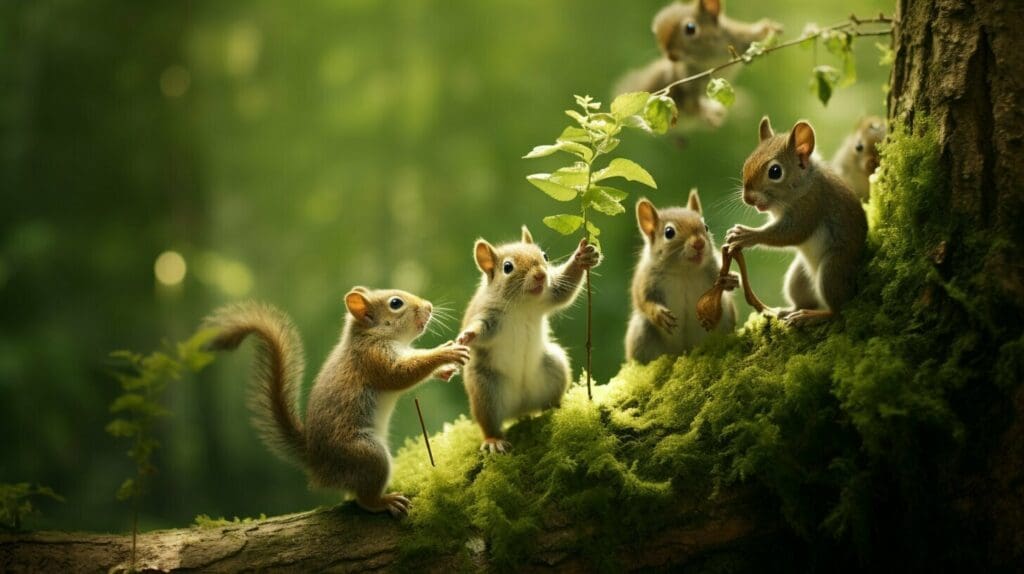
Squirrel Facts: Reasons to Love Squirrels
After exploring the positive aspects of squirrels, it’s hard not to develop a newfound appreciation for these furry creatures. Squirrels are more than just cute animals we see in our yards or at the park – they are intelligent, resourceful, and play a vital role in maintaining healthy ecosystems.
The Value of Observation
Next time you come across a squirrel in your backyard or a nearby park, take the time to observe their behavior. Watch as they scurry up a tree, nibble on a nut, and dart away at the sound of a nearby noise. This observation can help you develop a connection with these creatures and appreciate their unique characteristics.
The Importance of Conservation
Conserving squirrel populations is crucial for maintaining healthy ecosystems. Squirrels play a critical role in seed dispersal and forest regeneration by burying and forgetting their caches. Their impact on tree growth and the overall biodiversity of forests is undeniable. Furthermore, the positive impact squirrels have on human well-being, such as providing entertainment and a connection to nature, should not be overlooked.
Inspiration for a Better World
Squirrels can serve as a symbol of resourcefulness, adaptability, and perseverance. By observing and appreciating their positive qualities, we can be inspired to cultivate similar qualities in our own lives. Whether it’s finding creative solutions to problems or adapting to different situations, we can all learn from the squirrels who share our world.
In conclusion, squirrels are more than just cute animals – they are complex creatures with unique characteristics that contribute to the health of our ecosystems. By taking the time to appreciate them, we can develop a connection to the natural world and be inspired to cultivate similar positive qualities in our own lives.
FAQ
Q: What are the positive things about squirrels?
A: Squirrels have numerous positive aspects worth appreciating. Their agility, curiosity, and resourcefulness make them fascinating creatures. They play a vital role in ecosystems by contributing to seed dispersal and forest regeneration. Additionally, observing squirrels can provide entertainment and a connection to nature.
Q: What does squirrel behavior and characteristics entail?
A: Squirrels exhibit remarkable behavior and characteristics. They are agile and can easily navigate their surroundings. Their curiosity leads them to explore their environment, and their ability to adapt to different habitats showcases their resilience. They are known for caching food and building nests, demonstrating their resourcefulness.
Q: How intelligent are squirrels and what adaptations do they have?
A: Squirrels possess considerable intelligence and adaptations. They showcase problem-solving abilities, including memory and spatial cognition. Their sharp teeth enable them to crack open nuts, and their strong hind legs allow them to leap and climb with ease. Their bushy tails serve multiple purposes, aiding in balance and communication.
Q: What role do squirrels play in ecosystems?
A: Squirrels play an essential role in ecosystems. They contribute to seed dispersal and forest regeneration by burying and forgetting their food caches. This behavior aids in the growth of new trees and promotes biodiversity. Squirrels also help maintain healthy ecosystems by contributing to the overall balance of species.
Q: Why is squirrel conservation important?
A: Squirrel conservation is crucial for maintaining healthy ecosystems and preventing negative ecological impacts. By conserving squirrel populations, we can ensure the preservation of biodiversity and the stability of forest ecosystems. Squirrels also provide benefits to human well-being, such as entertainment and a connection to nature.
Q: What can we conclude about squirrels?
A: Squirrels are fascinating creatures with numerous positive aspects. Their behavior, characteristics, intelligence, and adaptations make them worthy of appreciation. By learning more about squirrels and observing their behavior in their natural habitat, we can develop a deeper understanding and connection with these remarkable animals.


